Instructors
The 2012 session of SCIE 300 has six instructors over both terms.
 Craig Burkett Term 1 and Term 2
Craig Burkett Term 1 and Term 2
Born and raised in Waterloo, ON, Craig Burkett studied aerospace engineering at the University of Toronto. He briefly worked on the CanadArm Space Shuttle project before leaving engineering to become a high school teacher. During his five years teaching math and science courses, Craig fell in love with statistics and returned to U of T to pursue graduate studies. His expertise comes from working as a freelance statistical consultant in the medical, sociological, and engineering fields.
A former track and field athlete, Craig maintains an active lifestyle including cycling, running, BJJ, squash, and volleyball. You can also find him directing choirs, and playing classical piano. His favourite piece to perform is Liszt’s Hungarian Rhapsody #2.
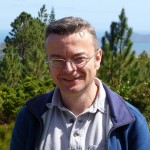 Sean Graham Term 1
Sean Graham Term 1
Sean is a prof in the Department of Botany who works on plant phylogeny and evolution. He grew up in Bangor, Northern Ireland, and started out as an undergrad in genetics at the University of St Andrews, in Scotland. He was lured to the dark side (plant systematics) during his PhD at the University of Toronto with Spencer Barrett, and a stint as a postdoc at the University of Washington with Dick Olmstead. He finds all branches of science fascinating, but his research specialty is in land plants and their diversification and biodiversity. His lab includes graduate students and undergraduate assistants, and has a strong emphasis on applying molecular tools, including various genomic methods. His teaching interests include vascular plants (BIOL/APBI 210) and graduate courses in communication and phylogenetic analysis. He also volunteers as an editor for several botanical journals, including American Journal of Botany. His office is in the Biodiversity Research Centre (the ‘Blue Whale’ building) where he is the associate director and an herbarium curator in the Beaty Museum. He is also the research director at the UBC Botanical Garden and Centre for Plant Research. His favourite plants to consume include Solanum tuberosum, Theobroma cacao and Hordeum vulgare, but he also quite likes kale pesto.
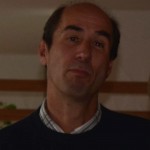 Reinhard Jetter Term 2
Reinhard Jetter Term 2
I got my undergraduate training in chemistry at the University of Munich, Germany, finished with a diploma thesis on organic synthesis and the physical chemistry of antiaromatic compounds. I then obtained my Ph.D. at the Botany Department of the University of Kaiserslautern, Germany (1993), with studies on waxes of various Poppy species carried out under guidance of Markus Riederer. Next, I moved to the Institute of Biological Chemistry at Washington State University, where I worked as a Postdoctoral Fellow with Rod Croteau (1994-96). My work at the IBC focused on the cloning and characterization of enzymes involved in the biosynthesis of conifer resin diterpenoids. I then worked as a Research Associate and independent group leader in the Biology Department at the University of Wuerzburg, Germany (1996-2003), where I began my investigations into the polyketides and triterpenoids found in plant skins. Finally, I joined the University of British Columbia in 2003, where I am now full professor and Canada Research Chair in Plant Natural Products Chemistry, with a cross-appointment between the Departments of Botany and Chemistry. I am leading a group of chemists and biologists focusing on the various aspects of plant surfaces, using a wide range of techniques. My projects are highly interdisciplinary, ranging from molecular genetics over enzyme mechanism and chemical product identification to the physiology of water transport and the chemical ecology of plant-insect-interactions.
 Jackie Stewart Term 1 and Term 2
Jackie Stewart Term 1 and Term 2
Jackie is an instructor in the Department of Chemistry. She has been teaching general and organic chemistry since 2005. Jackie’s research interests span the areas of self-regulated learning, problem solving, and assessment of learning. She is passionate about helping students learn through innovative instructional methods and by motivating them to use research-tested study techniques. Jackie received the Killam Teaching Award in 2006 and 2010, as well as the SUS Teaching Excellence Award in 2010. She enjoys cooking and has introduced several of her friends to her favourite vegetable: kale.
Robin Stoodley Term 1
Dr. Robin Stoodley is an instructor in the Department of Chemistry at UBC. There, he manages and teaches analytical chemistry laboratories for 2nd, 3rd and 4th year students as well as teaches a lecture section of Chem 211. His research background involved both chemistry and pharmaceutical sciences, specializing in a mixture of electrochemistry, models of drug action, spectroscopy and surface science. His teaching interests include complex problem-solving strategies and techniques for integration of clear communication with scientific content. He previously taught courses in chemistry, engineering chemistry, scientific writing, research proposal projects, and science and society at the University of Calgary. Prior to earning his Ph.D., he dabbled with various forms of gainful employment: in high-energy physics, in semiconductor physics, and in law enforcement.
 Andrew Trites Term 2
Andrew Trites Term 2
Dr. Andrew Trites is a professor and director of the Marine Mammal Research Unit at UBC and research director of the North Pacific Universities Marine Mammal Research Consortium. Dr. Trites has been studying marine mammals in the North Pacific for over 25 years. His research involves captive studies, field studies and simulation models that range from single species to whole ecosystems. His research program is designed to further the conservation and understanding of marine mammals, and resolve conflicts between people and marine mammals. He has published over 100 papers and is frequently interviewed by media on issues pertaining to marine mammals. He oversees a research program that includes researchers, students, technicians and support staff. The training of students, and the collaboration between researchers specializing in other disciplines (such as nutrition, ecology, physiology and oceanography) is central to the success of his research program. Visit his homepage.
Teaching assistants
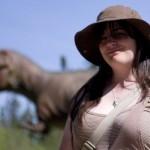 Hayley Dunning
Hayley Dunning
Hayley is a masters of journalism candidate at UBC and is an aspiring science writer. She has an undergraduate degree in environmental geoscience from the University of Bristol, UK, including a year abroad at the University of Iceland, and just finished her MSc in earth and atmospheric sciences at the University of Alberta. She has written science and technology articles for the University of Alberta’s student newspaper and alumni association newsletter. While at the University of Alberta, Hayley was a teaching assistant for several earth and atmospheric sciences undergraduate courses and took a course in writing about science with New Scientistwriter Bob Holmes. She was also involved in the local critical thinking community and gave a talk at LogiCON 2010 about science journalism. She also had a part time job at the Jurassic Forest, where she indulged in her love of dinosaurs.
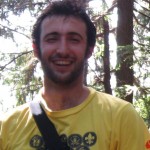 Nick Fishbane
Nick Fishbane
Nick is an MSc student in the Department of Statistics at UBC. He completed his undergraduate degree at McGill University in applied mathematics and, while there, also worked as a research assistant using statistical software to solve problems in mathematical ecology. He spent the last three years in mainland China, the last of which was spent writing a literature review in ecology. Upon completion of his degree, Nick hopes to apply his skills towards solving problems in ecology and environmental science. Other than English, Nick can speak French and Mandarin. In his free time, he enjoys playing soccer and will snowboard as much as possible during the long Vancouver rainy season.
 Pamela Lincez
Pamela Lincez
Pamela is a PhD candidate with the Department of Microbiology and Immunology at the UBC. She is originally from Ottawa and minus 30 degree weather, though eight years ago she drove across the country to Vancouver to find a warmer Canada and pursue another undergraduate degree- this time in Biotechnology. Her current thesis investigation into the immunological consequences of virus-induced autoimmunity is only one of her many pass-times. Her other passions include running, snowboarding, attending live music shows, and of course, scientific communication. Whenever there are a spare couple hours at the end of a day of experiments, Pamela writes her own blog For the Love of Science at pjlincez.blogspot.ca (a dialogue about current scientific affairs), writes articles for Nvate magazine- a start-up tech and science online and Kindle magazine, and she writes a couple entries for the Society of Canadian Women in Science and Technology blog. Following successful completion of the Banff Centre Science Communications Program in August 2012, Pamela made many great friendships and connections in the Science communication community and became creatively inspired to pursue new avenues in science communication including participation in a Science Poetry workshop. Her future plans include completing her doctorate so she can pursue a career as an editor and freelance science journalist (and be acknowledged as Dr. Pam on her VISA), traveling more of the world and near retirement, opening an organic sandwich and salad surf shack in Hawaii to be named Epic Salads.
Development team
In addition to the instructors, the development of SCIE 300 involved other key players.
 Eric Jandciu
Eric Jandciu
Eric is the SCIE 300 course coordinator. After blowing up a fume hood in the chemistry building, Eric was happy to complete his chemistry graduate work with a master’s degree and pursue further graduate work in journalism. His master of journalism thesis project explored the skills required by science journalists and proposed the curriculum for a graduate-level science journalism course, elements of which have been used at the UBC School of Journalism. Eric has worked as a freelance journalist, science writer, and grant writer. He has also worked for Springer in Heidelberg, Germany, managing the editing of English-language scientific manuscripts. In addition, Eric contributes to textbooks used in both Canadian and American high schools and junior high schools. When not nerding out on the intersection of science with society, Eric is hiking in the summer, skiing in the winter, and biking year round.
 Thomas Deane
Thomas Deane
Thomas gained his MSc in Zoology from UBC two years ago after studying invasive species interactions. Before coming to UBC, he worked as a horse racing journalist and sub-editor for the Press Association in the UK. He still writes the occasional freelance sports story. Thomas has always had a great interest in the natural environment, and it is his hope that teaching aspiring young scientists to communicate their thoughts and discoveries more effectively will ensure that important science-based news is accessible to everyone in the future. Thomas helps design some of the writing activities used in this course and in SCIE 113, and also works as a research associate with the Questions For Biology group at UBC (q4b.biology.ubc.ca).
 Shona Ellis
Shona Ellis
Shona Ellis is a senior instructor in the Department of Botany. Her research involved investigating the root chemistry of Ambrosia chamissonis (silver burr ragweed). She combines her passions for plant diversity and teaching as a lecturer and lab instructor. Courses she teaches include introductory botany, bryology, seed plant taxonomy, and plants and people. She has received two Killam Teaching Awards and is currently the associate head of biology.
Jennifer Love
Prof. Jennifer Love received her PhD in 2000 under the direction of Prof. Paul Wender at Stanford University. She was an NIH postdoctoral fellow in the lab of Prof. Robert Grubbs at Caltech from 2000-2003. She joined the faculty of the University of British Columbia in 2003 and was promoted to associate professor in 2009. Her research interests include the mechanistic investigation of M-X bond reactivity and applications in organic synthesis.
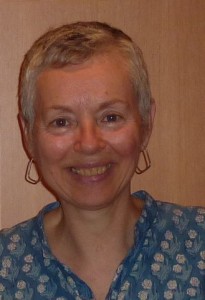 Joanne Nakonechny
Joanne Nakonechny
Joanne completed an MSc in anthropology at the Université de Montréal, an MEd in education at the University of British Columbia and a PhD in anthropology at McMaster University. Her interdisciplinary interests in learning at the post-secondary level have been informed by her varied professional background. Her previous positions include: coordinator for the Black Student Retention Project in the School of Engineering at the University of Virginia, project manager for the Native Community Care: Counselling and Development Program at Mohawk Community College, (Ontario), and learning skills coordinator at Simon Fraser University. For several years she also worked as an educational consultant. Joanne’s current research interests include enhancing reading comprehension at the post-secondary level, developing problem solving heuristics, using visual guides to develop deep structure learning, and exploring the new pedagogical possibilities offered by simulations and wiki-type technologies. As an anthropologist, her research methodology and theory is qualitatively based and uses an ethnographic approach for data collection. Joanne team teaches a graduate course for the life sciences (BIOL 535) on fundamentals of teaching, and facilitates instructional skills workshops and narrative skill workshops for the Centre for Teaching and Academic Growth.
The Centre for Teaching, Learning and Technology
CTLT works collaboratively with academic and administrative units throughout UBC to support technology-enabled learning environments. It also collaborates with university-wide partners to enhance the teaching practice of all members of the UBC teaching community.



